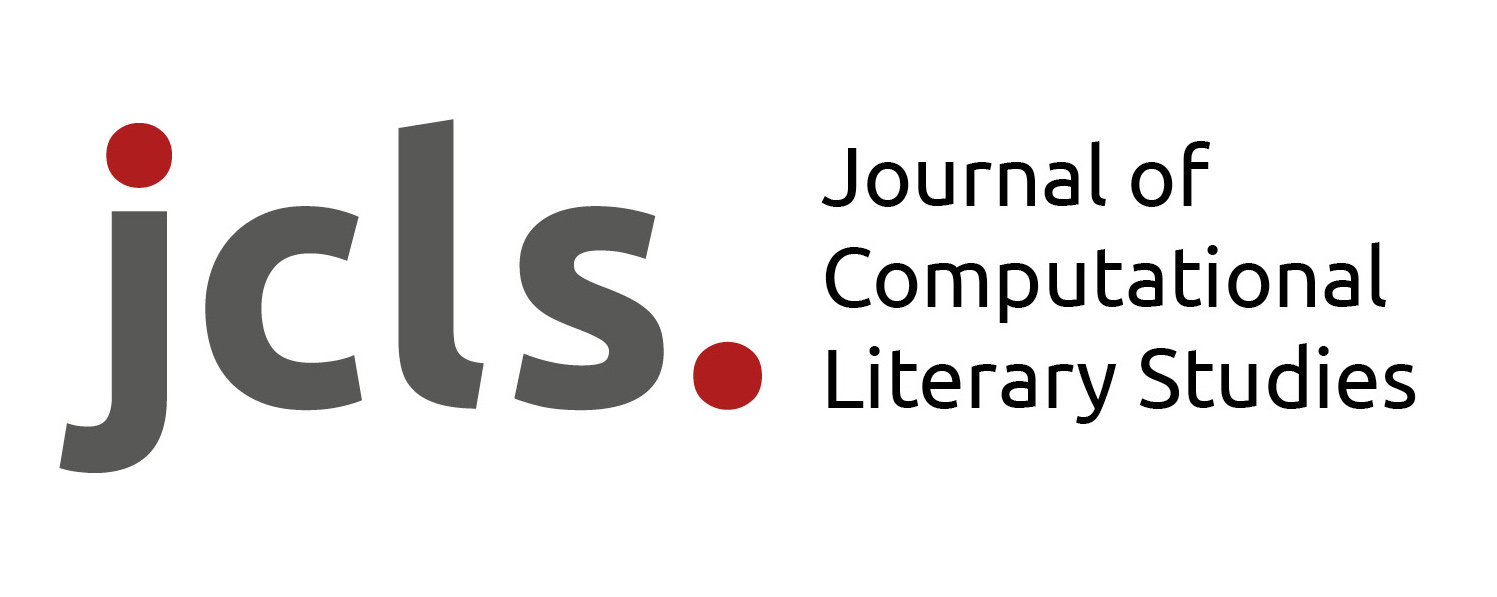Articles
28 results
Computational Approaches to Opera Libretti
Luca Giovannini and Daniil Skorinkin
2024-07-15 Volume 3 • Issue 1 • 2024 • 1–23
The Schemer Unmasked. Sketching a Digital Profile of the Scheming Slave in Roman Comedy
Julia Jennifer Beine
2024-05-27 Volume 3 • Issue 1 • 2024 • 1–29
Connecting the Dots. Variables of Literary History and Emotions in German-language Poetry
Leonard Konle, Merten Kröncke, Simone Winko and Fotis Jannidis
2024-03-28 Volume 2 • Issue 1 • 2023 • 1–22
What's that Scary Sound? Ambient Sound in Gothic Fiction
Svenja Guhr and Mark Algee-Hewitt
2024-03-24 Volume 2 • Issue 1 • 2023 • 1–28
What Do Characters Do? The Embodied Agency of Fictional Characters
Andrew Piper
2024-03-22 Volume 2 • Issue 1 • 2023 • 1–12
Need a Good Book about Privacy? Evaluating Dictionary-Based Corpus Query for Detecting the Topic of Privacy in Literary Texts
Erik Ketzan, Jennifer Edmond and Carl Vogel
2024-03-06 Volume 2 • Issue 1 • 2023 • 1–19
InvBERT: Reconstructing Text from Contextualized Word Embeddings by inverting the BERT pipeline
Kai Kugler, Simon Münker, Johannes Höhmann and Achim Rettinger
2024-03-05 Volume 2 • Issue 1 • 2023 • 1–18
The Authorship of Stephen King’s Books Written Under the Pseudonym “Richard Bachman”: A Stylometric Analysis
Dorothy Henriette Modrall Sperling, Mike Kestemont and Vincent Neyt
2024-03-02 Volume 2 • Issue 1 • 2023 • 1–35
Why the Daisy Sisters are Different. A Stylometric Study on the Oeuvre of Swedish Author Henning Mankell and the Dutch Translations of his Work
Martje Wijers
2024-02-25 Volume 2 • Issue 1 • 2023
Translation-based connotation visualization for classical poetic Japanese vocabulary of the Kokin Wakashū ca. 905
Xudong Chen, Hilofumi Yamamoto and Bor Hodošček
2024-02-16 Volume 2 • Issue 1 • 2023 • 1–32
Gender Depiction in Portuguese. Distant Reading Brazilian and Portuguese Literature
Cláudia Freitas and Diana Santos
2024-02-13 Volume 2 • Issue 1 • 2023 • 1–29
Automatic Topic-Guided Segmentation of Holocaust Survivor Testimonies
Eitan Wagner, Renana Keydar, Amit Pinchevski and Omri Abend
2024-02-10 Volume 2 • Issue 1 • 2023 • 1–26
Stylistic History of the Hungarian Novel Based on Sentence Structures
Botond Szemes
2024-02-10 Volume 2 • Issue 1 • 2023
Extracting Geographical References from Finnish Literature. Fully Automated Processing of Plain-Text Corpora
Harri Kiiskinen, Asko Nivala, Jasmine Westerlund and Juhana Saarelainen
2024-01-29 Volume 2 • Issue 1 • 2023
A Novel Approach for Identification and Linking of Short Quotations in Scholarly Texts and Literary Works
Frederik Arnold and Robert Jäschke
2024-01-29 Volume 2 • Issue 1 • 2023
Analyzing the Positive Sentiment Towards the Term “Queer” in Virginia Woolf through a Computational Approach and Close Reading
Heejoung Shin
2022-12-22 Volume 1 • Issue 1 • 2022
The (In-)Consistency of Literary Concepts. Operationalising, Annotating and Detecting Literary Comment
Anna Mareike Weimer, Florian Barth, Tillmann Dönicke, Luisa Gödeke, Hanna Varachkina, Anke Holler, Caroline Sporleder and Benjamin Gittel
2022-12-16 Volume 1 • Issue 1 • 2022
Using Parallel Corpora to Evaluate Translations of Ancient Greek Literary Texts. An Application of Text Alignment for Digital Philology Research
Chiara Palladino, Farnoosh Shamsian and Tariq Yousef
2022-12-13 Volume 1 • Issue 1 • 2022
Modeling and Measuring Short Text Similarities. On the Multi-Dimensional Differences between German Poetry of Realism and Modernism
Anton Ehrmanntraut, Thora Hagen, Fotis Jannidis, Leonard Konle, Merten Kröncke and Simone Winko
2022-12-08 Volume 1 • Issue 1 • 2022
Limericks and Computational Poetics: The Minimal Pairs Framework. Computational Challenges for Poetic Analysis and Synthesis
Almas Abdibayev, Yohei Igarashi, Allen Riddell and Daniel Rockmore
2022-12-07 Volume 1 • Issue 1 • 2022
Validating Topic Modeling as a Method of Analyzing Sujet and Theme
Julian Schröter and Keli Du
2022-12-06 Volume 1 • Issue 1 • 2022
Who Knows What in German Drama? A Composite Annotation Scheme for Knowledge Transfer. Annotation, Evaluation, and Analysis
Melanie Andresen, Benjamin Krautter, Janis Pagel and Nils Reiter
2022-12-01 Volume 1 • Issue 1 • 2022
Evaluation of Measures of Distinctiveness. Classification of Literary Texts on the Basis of Distinctive Words
Keli Du, Julia Dudar and Christof Schöch
2022-11-30 Volume 1 • Issue 1 • 2022
Towards an Event Based Plot Model. A Computational Narratology Approach
Evelyn Gius and Michael Vauth
2022-11-29 Volume 1 • Issue 1 • 2022
